Avurudu celebrations half a century ago
By Carol Aloysius
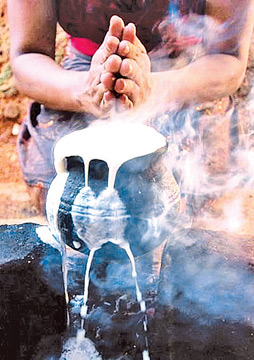 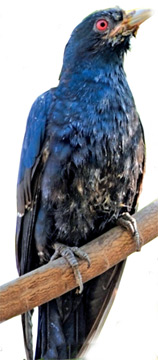 It was the melodious mating call of the koha (Asian Koel) mingling
with the sweet chirping of mynahs, sparrows and our feathered visitors
from cooler climes, that woke me this Avurudu morning. It was the melodious mating call of the koha (Asian Koel) mingling
with the sweet chirping of mynahs, sparrows and our feathered visitors
from cooler climes, that woke me this Avurudu morning.
Like many other Avurudu mornings I had experienced in my long span of
life, I step out into the garden awash with dew to breathe in the
fragrant perfume of jasmine, araliya mal, frangipani and bougainvillea
of our tree-laded garden.
The bright red erabudu flowers blooming in the majestic tree planted
by my father many years ago, dazzles my eyes.
The air is thick with the heavy scent of ripened jak scattered on the
ground from a tree I planted as a child, when our parents encouraged us
to plant a new tree for every Avurudu. No wonder our garden has so many
trees and flowers - from leafy vegetables to karapincha, from billing
fruits to guava, jak, lime, lemons, avocado, and jambu, from coconuts to
thambili and even pepper vines that spilt their seeds come Avurudu time.
These familiar scents and sights evoke a host of nostalgic memories.
Time stands still as I embark on my journey recalling Avurudu
celebrations of more than half a century ago...
Auspicious
Then, as now, we would wait for the auspicious time for the
celebrations to begin, clutching the crackers and fireworks ready to be
lit at precisely the time set according to the movement of the planets.
Guided only an heirloom of a bygone era - the large clock hanging on
our dining room wall, we would wait for the official announcement over
our ancient radio by the Sri Lanka Broadcasting Corporation.
No sooner the announcement was made, we would then dash out to be the
first to light our fireworks ahead of the neighbouring children.
The women in the house including my mother would rush to the kitchen
hearth. These kitchen hearths, rarely seen these days, were placed under
a large vent (chimney) that allowed the smoke to the garden outside.
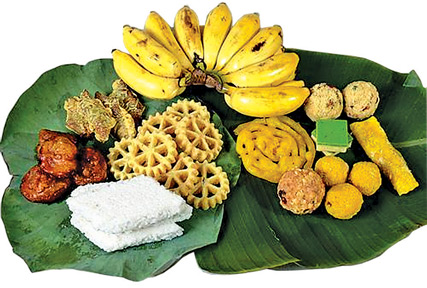 Hearths played an important role in the Avurudu celebrations. Days
before the New Year, women folk would prepare the sweetmeats. As they
fried, steamed, and cooked, the air would be thick with smoke and filled
with the pungent aroma of spices. Hearths played an important role in the Avurudu celebrations. Days
before the New Year, women folk would prepare the sweetmeats. As they
fried, steamed, and cooked, the air would be thick with smoke and filled
with the pungent aroma of spices.
On New Year's day, the hearth was where the first meal for the day
was cooked.
As they lit the fire and started cooking the traditional Avurudu meal
of kiribath, our mothers would also keep a watchful eye on the new clay
pot filled with fresh milk simmering on the fire till the contents
spilled over... This, according to them, was a signal of prosperity in
the new year.
The meal would begin with the entire family sharing a piece of newly
cooked kiribath, which took pride of place in every home.
This would be eaten with the hot katta sambol, seeni sambol, haal
messa curry, egg curry and dhal.
A variety of traditional sweetmeats would then be placed on the
table; konde kavum, munkavum and kavums of different shapes, sizes and
filling, kokis, aasme, aggala, kaludodol, and sweets - coconut rock,
milk toffee and jaggery toffee.
In Hindu homes they would serve pookei (a kind of milk rice full of
raisins and nuts, vade, murukku, thosai, idli and mani pittu.
While the curries would be mostly vegetable cooked in a variety of
flavours and methods. No one who came to our houses went away hungry
during the Avurudda.
At the doorway to every Hindu home would be exquisitely drawn designs
(kolam) made of coloured coconut refuse or flour or else waste material,
and every archway had a bunch of banana leaves tied to it- symbols of
prosperity and good luck.
Games
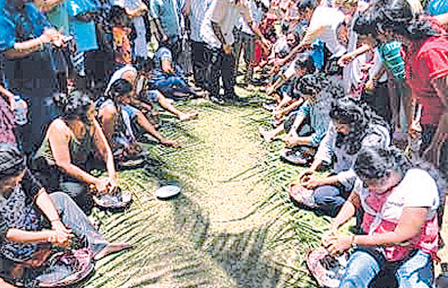 For us children it was the Avurudu games that interested us most. As
girls, the Avurudu sellam (New year games) we enjoyed playing most was
Hop Scotch and swinging on the large swing our father had tied to a
strong branch of a tree at the back of the garden. We also joined the
boys in playing softball cricket and marbles, even taking part in some
vigorous games such as badminton, sack races, lime and spoon races and
tug of war. For us children it was the Avurudu games that interested us most. As
girls, the Avurudu sellam (New year games) we enjoyed playing most was
Hop Scotch and swinging on the large swing our father had tied to a
strong branch of a tree at the back of the garden. We also joined the
boys in playing softball cricket and marbles, even taking part in some
vigorous games such as badminton, sack races, lime and spoon races and
tug of war.
Disappearing
When these time honoured customs and traditions began disappearing
with time, our parents insisted on taking us down South where many of
these customs had managed to survive in their original forms.
While we were there, we girls would join girls of our age in swinging
contests which we thoroughly enjoyed. I well remember the sight of two
girls occupying a single swing, one standing and the other sitting while
another girl pushed the swing from below, singing Avurudu gathas, and
having the time of their lives...
Nor were the elders forgotten. One New Year spent in a rustic village
at Moneragala, I watched with fascination a group of women, some quite
old and seemingly feeble, taking part in a raban contest.
At a signal given them, the women (four of them sitting around each
rabana) began beating the drum with their hands vigorously while singing
kavi to the beat.
The winner was able to replicate the beat of her opponent giving her
own version, and earned herself the coveted prize of 200 rupees and a
towel, then considered a lottery win!
There were other games in which everyone was encouraged to take part.
Some of them were climbing the greasy pole and pora pol (a game where
the contestant from one side threw a coconut to the opposite side in an
effort to crack the nut in mid air.)
Others included chak gudu, volley ball, pillow fighting and cycle
races... The most awaited event was of course the selection of the
Avurudu Kumari and Kumaraya.
According to ancient belief, (both in India and in Sri Lanka), at the
New Year a new deity called Avurudu Kumaraya took charge of nature.
In some parts of Sri Lanka, we were told, they even make an altar
with tender coconut palms for this deity, while in other areas specially
in the South, a lamp is lit for the Avurudu Kumaraya.
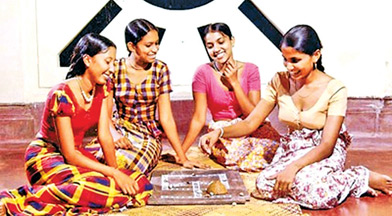 No sooner the winners chosen from several hopeful young females and
males were announced we would cheer them with wild clapping and
whistling as they were escorted to a stage to be crowned and showered
with gifts. No sooner the winners chosen from several hopeful young females and
males were announced we would cheer them with wild clapping and
whistling as they were escorted to a stage to be crowned and showered
with gifts.
Fancy dress
The grand finale was the fancy dress competition where all of us,
including even our parents took part.
It is heartening to see that these ancient customs and traditions in
danger of extinction today, are now being revived by various
organisations including several business establishments and hotels, one
leading Colombo hotel even creating a typical Mada gedera complete with
thatched roof, encouraging guests to sit on the floor and partake their
traditional new year fare.
This year's New Year came early for us. Our cricketing champions'
victory at the World T20 tournament final against India saw people from
all ethnic groups setting the skies ablaze with fireworks and dancing on
the streets to celebrate the nation's golden moment of triumph in
cricketing history. Inspired by this historical win it seems a new
spirit of unity has been injected into this year's Avurudu celebrations.
As New Year falls tomorrow we can only hope that the same spirit of
unity that made our nation celebrate our the cricketing victory, will
strengthen with the passing years.
Then our country will truly become ‘One Sri Lanka, One Nation'. |

